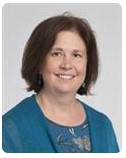
Interesting Cases in the Lung and Mediastinum: Things are Often Not as They Seem
Jennifer Brainard, MD |
As cytologists working with interventional pulmonologists, it is important to be prepared for the unexpected! On- site adequacy assessment provides an opportunity to both ensure a diagnostic sample and to triage specimens in real time. Additionally, the use of ancillary testing is invaluable in arriving at an accurate final diagnosis. Triage and use of ancillary studies combined with morphologic diagnosis allows patients to derive maximal benefit from the samples collected.In this session, we will review interesting cases from the lung and mediastinum where there are interesting twists and pitfalls to overcome. We will highlight what can be done to increase our chances of getting it right!
Target Audience
This educational activity is designed for pathologists, cytopathologists, cytotechnologists, students and other members of the cytopathology community.
Learning Objectives
- Discuss collection and triage of cytology samples derived from interventional pulmonology procedures to maximize diagnostic yield
- Recognize and avoid pitfalls associated with challenging cases from the lung and mediastinum
- Understand the use of ancillary testing to facilitate accurate diagnosis in the lung and mediastinal samples
Jennifere Brainard, MD
Vice Chair of Pathology Operations
Cleveland Clinic Foundation
Cleveland, Ohio
The presenter has no conflicts of interest or financial relationships to disclose.
Continuing Medical Education (CME) Statement
The American Society of Cytopathology is accredited by the Accreditation Council for Continuing Medical Education to provide continuing medical education for physicians. The American Society of Cytopathology designates this enduring educational activity for a maximum of 2.0 AMA PRA Category 1 Credits™. Physicians should only claim credit commensurate with the extent of their participation in the activity.
American Board of Pathology Maintenance of Certification (CC)
This product can help fulfill the CME requirements and Self-Assessment Modules (SAMs) mandated by the American Board of Pathology Continuing Certification (CC) process. Earn up to 2.0 SAM Credit Hours.
Continuing Medical Laboratory Education (CMLE)
The ASC designates this activity for a maximum of 2.0 Continuing Medical Laboratory Education (CMLE) credit hours for non-physicians. The CMLE credit hours meet the continuing education requirements for the ASCP Board of Registry Certification Maintenance Program. Participants should claim only the credit commensurate with the extent of their participation in the activity.
Cytotechnologists with Licenses in Florida and California
This program is approved for 2 continuing education credits in the State of Florida and 1 in the State of California. The credit on each link is good for three years from the live presentation date.
Available Credit
- 2.00 AMA PRA Category 1 Credit™
- 1.00 California Credits
- 2.00 CMLE
- 2.00 Florida Credits
- 2.00 MOC II
- 2.00 Participant

 Facebook
Facebook X
X LinkedIn
LinkedIn Forward
Forward